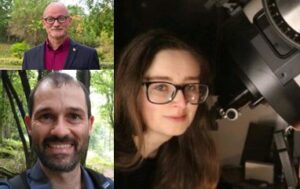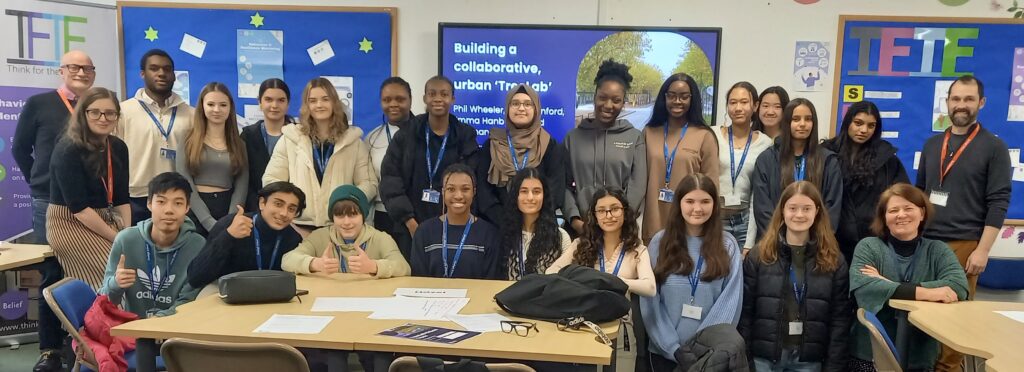
Richard Holliman, Phil Wheeler and Alice Dunford, The Open University, UK.
Denbigh students and teachers have helped to inform future priorities for urban tree research in Milton Keynes.
Why did we engage with students and teachers from Denbigh School?
The Natural Environment Research Council, also known as NERC, funded staff from the Open University and Forest Research to explore an aspect of ecology, urban tree research. The project was called TreeLab.
NERC funded us to:
- create or develop relevant, sustainable, and equitable research partnerships and research strategies involving members of the public, public intermediaries and researchers;
- test the feasibility of this partnership;
- facilitate co-creation and submission of the full research application with partners.
‘Co-creating’ research priorities
We addressed these objectives through engagement with a range of groups from Milton Keynes (where the Open University hosts its largest offices).
We worked with groups with interests in urban trees, including urban tree managers and community groups with interests in the natural environment.
We also engaged with members of the public, including a representative group of adult citizens from across Milton Keynes and, significantly for this blog post, students and teachers from Denbigh School.
We engaged with different groups with the main aim of identifying a research theme for a larger research project into urban trees.
What did we do?
We engaged with Year 12 students from Denbigh School through two workshops, with roughly two weeks between them. The gap was deliberate. We wanted to give the students an opportunity to prepare for the second workshop, and it worked. The students delivered amazingly professional pitches.

Year 12 students from Denbigh School in Milton Keynes, alongside Louisa Pretorious (teacher), Richard Holliman, Alice Dunford and Richard Holliman. Photo: Emma Hanby.
In the first of the two workshops, we focused on exploring what the students already understood about research, citizen science, and the values they associated with urban trees. Highlights of this first workshop included a quiz called ‘universitree challenge’ (hosted by Phil) and the introduction of the challenge for the second workshop.
In the second of the two workshops, the students took control, delivering short elevator pitches in the vein of the popular BBC TV format, Dragon’s Den. The students worked in teams of four to five to put together their pitches and present them in five-minute slots. The ‘dragons’ assessed the pitches for, among other things, relevance and impact.
The focus of the pitches that the students presented included: ‘Eco-therapy in urban spaces’, ‘To what extent do trees positively impact mental and physiological health?’, ‘The effects of urban trees on air quality’, and ‘What life does a tree sustain?’
Following the two school workshops and workshops with other external groups, we conducted a joint online workshop with all the partners to share ideas between the different groups and produce a consensus set of priorities for a larger proposal.
Next steps
We are writing a larger research proposal, which we will submit to NERC for their consideration and assessment. Our aim is to fund a nationally significant urban tree research project.
Our application to fund this larger research proposal is part of a competitive process. More proposals will fail at this next stage than will be funded. But this does not detract from the amazing contributions from students and teachers at Denbigh School.
Thank you to…
We are extremely grateful to the following contributors from Denbigh School:
Year 12 students: Serena Atwal, Pak Ho Lam, Beth McPherson; Matthew McKenna, Megan Dawkins, Effie Essel, Sophie Graham, Deborah Onyemaechi, Erykah Sowden, Ashna Brahmbhatt, Mojolaoluwa Sola-Eniolawun, Ashni Rajendram, Anaya Patel, Alysha Miah, Ufoma Odivwri, Juli Kwok, Hooriya Sabeel, Emily Shipman-Moore, Hassan Shahzad, Japheth Ogugua, Julia Pawlik, and Osaremwen Okpaire Peters.
Teachers: We were supported in the classroom by Emma Hanby and Louisa Pretorious. Helen Brown, Jon Burgess, Emma Hanby and Anthony Steed supported planning for these activities.
The authors
This post is a work of joint authorship involving Richard Holliman, Alice Dunford and Phil Wheeler.
The authors are members of the NERC-funded ‘TreeLab’ Project. TreeLab involves staff based in the Faculty of Science, Technology, Engineering and Mathematics at the Open University (also including Kadmiel Maseyk and Janice Ansine), colleagues from Forest Research (Kieron Doick and Kate Hand) and Kirsty Forshaw.
Who funded us?
TreeLab was funded through a co-creation bursary by the Natural Environment Research Council (NERC; NE/Y005856/1).
NERC is the largest and most significant funder for research into the environmental sciences in the UK. They commission research, infrastructure and training in support of new advances in the environmental sciences.
For NERC, environmental sciences include: atmospheric physics and chemistry; climate and climate change; ecology, biodiversity and systematics; geosciences; marine environments; polar sciences; science-based archaeology; and terrestrial and freshwater environments.
